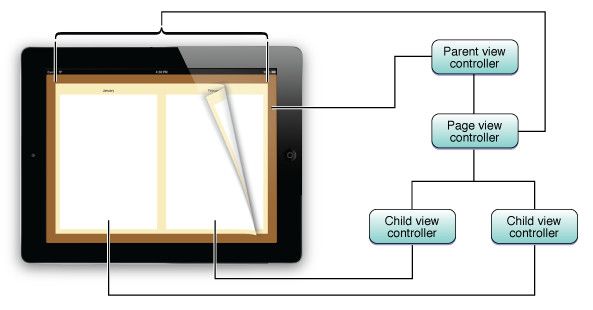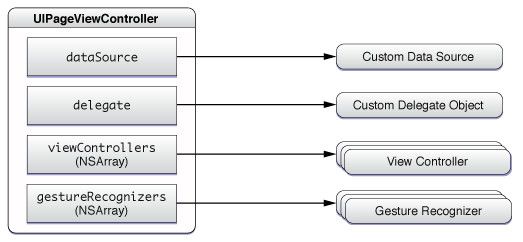- 【iOS】MVC设计模式
Magnetic_h
iosmvc设计模式objective-c学习ui
MVC前言如何设计一个程序的结构,这是一门专门的学问,叫做"架构模式"(architecturalpattern),属于编程的方法论。MVC模式就是架构模式的一种。它是Apple官方推荐的App开发架构,也是一般开发者最先遇到、最经典的架构。MVC各层controller层Controller/ViewController/VC(控制器)负责协调Model和View,处理大部分逻辑它将数据从Mod
- OC语言多界面传值五大方式
Magnetic_h
iosui学习objective-c开发语言
前言在完成暑假仿写项目时,遇到了许多需要用到多界面传值的地方,这篇博客来总结一下比较常用的五种多界面传值的方式。属性传值属性传值一般用前一个界面向后一个界面传值,简单地说就是通过访问后一个视图控制器的属性来为它赋值,通过这个属性来做到从前一个界面向后一个界面传值。首先在后一个界面中定义属性@interfaceBViewController:UIViewController@propertyNSSt
- UI学习——cell的复用和自定义cell
Magnetic_h
ui学习
目录cell的复用手动(非注册)自动(注册)自定义cellcell的复用在iOS开发中,单元格复用是一种提高表格(UITableView)和集合视图(UICollectionView)滚动性能的技术。当一个UITableViewCell或UICollectionViewCell首次需要显示时,如果没有可复用的单元格,则视图会创建一个新的单元格。一旦这个单元格滚动出屏幕,它就不会被销毁。相反,它被添
- vue3中el-table中点击图片放大时,被表格覆盖
叫我小鹏呀
vue.jsjavascript前端
问题:vue3中el-table中点击图片放大时,被表格覆盖。解决方法:el-image添加preview-teleported
- Android应用性能优化
轻口味
Android
Android手机由于其本身的后台机制和硬件特点,性能上一直被诟病,所以软件开发者对软件本身的性能优化就显得尤为重要;本文将对Android开发过程中性能优化的各个方面做一个回顾与总结。Cache优化ListView缓存:ListView中有一个回收器,Item滑出界面的时候View会回收到这里,需要显示新的Item的时候,就尽量重用回收器里面的View;每次在getView函数中inflate新
- 2019-07-09 AutoCompleteTextView 问题
皮皮铭
实现自定义Adapter要实现Filterable接口,不然会报错重写getFilter()方法performFiltering()方法实现过滤数据的操作publishResults()用来接收performFiltering()的返回值,发布。
- Android实现监听事件的方法
Amy木婉清
1.通过内部类实现2.通过匿名内部类实现3.通过事件源所在类实现4.通过外部类实现5.布局文件中onclick属性(针对点击事件)1.通过内部类实现代码:privateButtonmBtnEvent;//oncreate中mBtnEvent.setOnClickListener(newOnClick());//内部类实现监听classOnClickimplementsView.OnClickLis
- uniapp使用内置地图选择插件,实现地址选择并在地图上标点
神夜大侠
Uniappvue.jsuniapp
uniapp使用内置地图选择插件,实现地址选择并在地图上标点代码如下:page{background:#F4F5F6;}::-webkit-scrollbar{width:0;height:0;color:transparent;}page{height:100%;width:100%;font-size:24rpx;}image,view,input,textarea,label,text,na
- iOS下拉放大效果
RobinZhao
好多下拉放大的实现方式是在tableView上面添加一个view,同时更改tableView.contentInset,下拉时改变view的frame来实现。今天用另外一种方式实现,效果如下:加油.gif具体实现方法:通过tableViewCell结合xib来实现,具体代码如下HomeViewController.m代码#import"HomeViewController.h"#import"He
- 复盘
赵建庄
行动后反思,AAR(AfterActionReview),是知识管理的一种工具,起源于美国陆军的作战方法,强调在每次行动后进行及时反思、总结和改进。《复盘》一书其实就是这种方法的具体应用,名字不同,然而实质相同。相比AAR这样的说法,复盘更简洁,容易被国人接受,而且,书中给出了非常详细的步骤,有较强的指导意义和实战性,AAR的六步法,说的比较简单,有人可以悟,结合实际业务演变出各种变化,大多数人可
- 华为坤灵路由器配置SSH
redmond88
网络技术华为ssh运维
配置SSH服务器的管理网口IP地址。system-view[HUAWEI]sysnameSSHServer[SSHServer]interfacemeth0/0/0[SSHServer-MEth0/0/0]ipaddress10.248.103.194255.255.255.0[SSHServer-MEth0/0/0]quit在SSH服务器端生成本地密钥对。[SSHServer]rsalocal-
- 华为坤灵路由器初始化开局的注意事项,含NAT配置
redmond88
网络技术华为服务器运维
坤灵路由器比较坑,无web界面,全程命令行配置,但是版本更新导致和华为企业路由器配置很多不一样的地方,今天介绍下1、aaa密码复杂度修改:#使能设备对密码进行四选三复杂度检查功能。system-view[HUAWEI]aaa[HUAWEI-aaa]local-aaa-userpasswordpolicyadministrator[HUAWEI-aaa-lupp-admin]passwordcomp
- 关于UI刷新重绘
草帽小子J
最近做了一个关于用户雷达图的需求,有用到关于ui绘制相关的东西,于是去了解了下关于invalidate()、postInvalidate()、requestLayout()的知识。invalidate该方法会请求重绘view树,即draw(),刷新UI,并且不会调用onMeasure(),谁调用重绘谁,ViewGroup则重绘整个ViewGroup.一般会触发invalidate的主要为如下几种方
- electron多标签页模式更像客户端
diygwcom
electronjavascript前端
Electron多标签页模式是指在Electron框架中实现的类似Web浏览器的多标签页功能。Electron是一个使用Web技术(HTML、CSS和JavaScript)来创建跨平台桌面应用程序的框架。在Electron中实现多标签页模式,通常需要借助一些特定的库或组件,如BrowserView或electron-tabs,或者通过自定义实现。实现方式1.使用BrowserViewBrowser
- PCL 点云视窗类CloudViewer
LeonDL168
PCL算法计算机视觉人工智能视觉检测图像处理
点云视窗类CloudViewer是简单显示点云的可视化工具类,可以让用户用尽可能少的代码查看点云。注意:点云视窗类不能应用于多线程应用程序中。简单点云可视化如果用户想用几行代码可视化程序中所对应的地物,可以使用下面的代码:#include//...voidfoo(){pcl::PointCloud::Ptrcloud;//...为cloud添加对应的场景pcl::visualization::Cl
- Android干净架构MVI模板使用指南
井美婵Toby
Android干净架构MVI模板使用指南android-clean-architecture-mvi-boilerplateAforkofourcleanarchitectureboilerplateusingtheModel-View-Intentpattern项目地址:https://gitcode.com/gh_mirrors/an/android-clean-architecture-mv
- 《Android进阶之光》读书笔记
soleil雪寂
读书笔记#Android进阶之光
文章目录第1章Android新特性1.1.Android5.0新特性1.2.RecyclerView1.1.4.3种Notification1.1.5.Toolbar与Palette1.1.6.Palette1.2.Android6.0新特性1.2.2.运行时权限机制1.3.Android7.0新特性第2章MaterialDesign2.2.DesignSupportLibrary常用控件详解第3
- 《Android进阶之光》— Android 书籍
王睿丶
Android永无止境《Android进阶之光》Android书籍Androidphoenix移动开发
文章目录第1章Android新特性1第2章MaterialDesign48第3章View体系与自定义View87第4章多线程编程165第5章网络编程与网络框架204第6章设计模式271第7章事件总线308第8章函数响应式编程333第9章注解与依赖注入框架382第10章应用架构设计422第11章系统架构与MediaPlayer框架460出版年:2017-7简介:《Android进阶之光》是一本And
- 【拖拽】自定义拖拽图标
风露_
一、知识点设置被拖拽的元素draggable为true(HTML5新特性)关键方法:voiddataTransfer.setDragImage(img,xOffset,yOffset);注意点:Note:Ifthe[Element]isanexisting[HTMLElement],itneedstobevisibleintheviewportinordertobeshownasadragfeed
- Mac 技术篇-应用程序被锁定无法进行卸载问题解决方法,文件、文件夹被锁定无法移入废纸篓处理方法
lq9527_
Mac使用macos
在卸载Karabiner-Elements和Karabiner-EventViewer软件时,提示应用锁定,无法卸载。参照方法。在进行/bin/ls-dleO@App路径操作后,返回提示信息与链接方法略有区别。/bin/ls-dleO@App路径drwxr-xr-x@3root wheel uchg96 3 1 2022/Applications/Karabiner-Elements.appcom
- Kotlin 代替Java接口回调,就这么简单
深海呐
Android#Kotlinjavakotlin开发语言
假如你使用旧的接口回调:通常三步:1定义接口和方法;2使用接口中方法;3继承接口并实现方法;例:classXXXAdapter{publicvarmClickCollBack:clickCollBack?=null//1定义interfaceclickCollBack{//1定义funclick(int:Int)//1定义}itemView.setOnClickListener{mClickCol
- MultiSnapRecyclerView:让Android RecyclerView的滚动停靠更灵活
技术无疆
Androidandroiduiandroidstudioandroid-studiojavaandroidx
在Android应用开发中,RecyclerView是一个强大且灵活的组件,用于展示大量数据集合。然而,标准的RecyclerView只支持单一的滚动停靠点,这在某些场景下可能不够灵活。为了解决这个问题,TakuSemba开发了一个名为MultiSnapRecyclerView的库,它允许开发者在RecyclerView中实现多个滚动停靠点。文章目录什么是MultiSnapRecyclerView
- 压测服务器并使用 Grafana 进行可视化
豆瑞瑞
grafana
简介仓库代码GitCode-全球开发者的开源社区,开源代码托管平台参考Welcome!-TheApacheHTTPServerProjectGrafana|查询、可视化、警报观测平台https://prometheus.io/docs/introduction/overview/
- MTK Camera2 预览图成像质量差(马赛克)
AQUARICES
Androidjavaandroid
MTK推送来的原生Camera2应用拍照之后生成的预览图(Thumbnail)居然是马赛克!!但如果点击预览图之后再退出,就又是正常的。Camera2对于更新预览图的操作位于:vendor/mediatek/proprietary/packages/apps/Camera2/host/src/com/mediatek/camera/ui/ThumbnailViewManager.java这个函数对
- Android面试从新手到架构师,一篇解析就够(1),跳槽字节跳动
m0_60607609
程序员androidjava面试后端
5.抽象工厂模式:结构型(7):描述如何将类或对象按某种规则组成更大的结构1.桥接模式:对于两个或以上纬度独立变化的场景,将抽象与具体实现分离,实例:用不同颜色画不同形状2.外观模式:对外有一个统一接口,外部不用关心内部子系统的具体实现,这是"迪米特原则"的典型应用3.适配器模式:改变类的接口,使原本由于接口不匹配而无法一起工作的两个类能够在一工作,实例:RecycleView的Adapter不管
- 面试总结1
Xl_Lee
性能优化1.造成tableView卡顿的原因有哪些?1.最常用的就是cell的重用,注册重用标识符如果不重用cell时,每当一个cell显示到屏幕上时,就会重新创建一个新的cell如果有很多数据的时候,就会堆积很多cell。如果重用cell,为cell创建一个ID,每当需要显示cell的时候,都会先去缓冲池中寻找可循环利用的cell,如果没有再重新创建cell2.避免cell的重新布局cell的布
- Android SurfaceTexture和GLSurfaceView做Camera预览
小小攻城师
AndroidSurfaceTextureGLSurfaceViewSurfaceTextureopenGopenGL
GLSurfaceView是OpenGL中的一个类,也是可以预览Camera的,而且在预览Camera上有其独到之处。独到之处在哪?当使用Surfaceview无能为力、痛不欲生时就只有使用GLSurfaceView了,它能够真正做到让Camera的数据和显示分离,所以搞明白了这个,像Camera只开预览不显示这都是小菜,妥妥的。Android4.0的自带Camera源码是用SurfaceView
- iOS使用SDWebview加载图片失败?
AnderQZ
今天调试遇到一个很无奈的问题,就是出现了image无法加载出来。最后才发现是图片使用了中文命名,真TM的坑!SDWebimage没办法识别中文,必须要encode才行!
- 生产者消费者模式_Labview基础之生产者消费者设计模式(事件)
weixin_39532699
生产者消费者模式
1绪论近期,开了一个QQ群,刚开始的目的也是想多拉写软件相关的大神,有问题的时候也可以交流交流。记得当时有个软件在写的时候遇到了一个棘手的问题,outlook邮箱配置账户密码的问题,到现在也没解决,算了,也不是很迫切。2000人群就留在那里爬虫发单吧!建群以后才发现,原来这一块的小白还挺多,总结起来就一个原因:做这个软件的大多数都不是软件出生,都是因为临时要搭建一个上位机平台,匆匆入门......
- Android MVVM 架构应用实现(2)
渊Y
程序员android架构
Repository类:实现BmobRepository类,作为HomeViewModel的数据提供方。BmobRepository类中有一个挂起函数getAllRecommendLibrary(libraryRecommendData:MutableLiveData)用来获取云数据库中的数据,函数的参数是LiveData,在获取数据后,利用setValue通知View展示数据。classBmob
- 分享100个最新免费的高匿HTTP代理IP
mcj8089
代理IP代理服务器匿名代理免费代理IP最新代理IP
推荐两个代理IP网站:
1. 全网代理IP:http://proxy.goubanjia.com/
2. 敲代码免费IP:http://ip.qiaodm.com/
120.198.243.130:80,中国/广东省
58.251.78.71:8088,中国/广东省
183.207.228.22:83,中国/
- mysql高级特性之数据分区
annan211
java数据结构mongodb分区mysql
mysql高级特性
1 以存储引擎的角度分析,分区表和物理表没有区别。是按照一定的规则将数据分别存储的逻辑设计。器底层是由多个物理字表组成。
2 分区的原理
分区表由多个相关的底层表实现,这些底层表也是由句柄对象表示,所以我们可以直接访问各个分区。存储引擎管理分区的各个底层
表和管理普通表一样(所有底层表都必须使用相同的存储引擎),分区表的索引只是
- JS采用正则表达式简单获取URL地址栏参数
chiangfai
js地址栏参数获取
GetUrlParam:function GetUrlParam(param){
var reg = new RegExp("(^|&)"+ param +"=([^&]*)(&|$)");
var r = window.location.search.substr(1).match(reg);
if(r!=null
- 怎样将数据表拷贝到powerdesigner (本地数据库表)
Array_06
powerDesigner
==================================================
1、打开PowerDesigner12,在菜单中按照如下方式进行操作
file->Reverse Engineer->DataBase
点击后,弹出 New Physical Data Model 的对话框
2、在General选项卡中
Model name:模板名字,自
- logbackのhelloworld
飞翔的马甲
日志logback
一、概述
1.日志是啥?
当我是个逗比的时候我是这么理解的:log.debug()代替了system.out.print();
当我项目工作时,以为是一堆得.log文件。
这两天项目发布新版本,比较轻松,决定好好地研究下日志以及logback。
传送门1:日志的作用与方法:
http://www.infoq.com/cn/articles/why-and-how-log
上面的作
- 新浪微博爬虫模拟登陆
随意而生
新浪微博
转载自:http://hi.baidu.com/erliang20088/item/251db4b040b8ce58ba0e1235
近来由于毕设需要,重新修改了新浪微博爬虫废了不少劲,希望下边的总结能够帮助后来的同学们。
现行版的模拟登陆与以前相比,最大的改动在于cookie获取时候的模拟url的请求
- synchronized
香水浓
javathread
Java语言的关键字,可用来给对象和方法或者代码块加锁,当它锁定一个方法或者一个代码块的时候,同一时刻最多只有一个线程执行这段代码。当两个并发线程访问同一个对象object中的这个加锁同步代码块时,一个时间内只能有一个线程得到执行。另一个线程必须等待当前线程执行完这个代码块以后才能执行该代码块。然而,当一个线程访问object的一个加锁代码块时,另一个线程仍然
- maven 简单实用教程
AdyZhang
maven
1. Maven介绍 1.1. 简介 java编写的用于构建系统的自动化工具。目前版本是2.0.9,注意maven2和maven1有很大区别,阅读第三方文档时需要区分版本。 1.2. Maven资源 见官方网站;The 5 minute test,官方简易入门文档;Getting Started Tutorial,官方入门文档;Build Coo
- Android 通过 intent传值获得null
aijuans
android
我在通过intent 获得传递兑现过的时候报错,空指针,我是getMap方法进行传值,代码如下 1 2 3 4 5 6 7 8 9
public
void
getMap(View view){
Intent i =
- apache 做代理 报如下错误:The proxy server received an invalid response from an upstream
baalwolf
response
网站配置是apache+tomcat,tomcat没有报错,apache报错是:
The proxy server received an invalid response from an upstream server. The proxy server could not handle the request GET /. Reason: Error reading fr
- Tomcat6 内存和线程配置
BigBird2012
tomcat6
1、修改启动时内存参数、并指定JVM时区 (在windows server 2008 下时间少了8个小时)
在Tomcat上运行j2ee项目代码时,经常会出现内存溢出的情况,解决办法是在系统参数中增加系统参数:
window下, 在catalina.bat最前面
set JAVA_OPTS=-XX:PermSize=64M -XX:MaxPermSize=128m -Xms5
- Karam与TDD
bijian1013
KaramTDD
一.TDD
测试驱动开发(Test-Driven Development,TDD)是一种敏捷(AGILE)开发方法论,它把开发流程倒转了过来,在进行代码实现之前,首先保证编写测试用例,从而用测试来驱动开发(而不是把测试作为一项验证工具来使用)。
TDD的原则很简单:
a.只有当某个
- [Zookeeper学习笔记之七]Zookeeper源代码分析之Zookeeper.States
bit1129
zookeeper
public enum States {
CONNECTING, //Zookeeper服务器不可用,客户端处于尝试链接状态
ASSOCIATING, //???
CONNECTED, //链接建立,可以与Zookeeper服务器正常通信
CONNECTEDREADONLY, //处于只读状态的链接状态,只读模式可以在
- 【Scala十四】Scala核心八:闭包
bit1129
scala
Free variable A free variable of an expression is a variable that’s used inside the expression but not defined inside the expression. For instance, in the function literal expression (x: Int) => (x
- android发送json并解析返回json
ronin47
android
package com.http.test;
import org.apache.http.HttpResponse;
import org.apache.http.HttpStatus;
import org.apache.http.client.HttpClient;
import org.apache.http.client.methods.HttpGet;
import
- 一份IT实习生的总结
brotherlamp
PHPphp资料php教程php培训php视频
今天突然发现在不知不觉中自己已经实习了 3 个月了,现在可能不算是真正意义上的实习吧,因为现在自己才大三,在这边撸代码的同时还要考虑到学校的功课跟期末考试。让我震惊的是,我完全想不到在这 3 个月里我到底学到了什么,这是一件多么悲催的事情啊。同时我对我应该 get 到什么新技能也很迷茫。所以今晚还是总结下把,让自己在接下来的实习生活有更加明确的方向。最后感谢工作室给我们几个人这个机会让我们提前出来
- 据说是2012年10月人人网校招的一道笔试题-给出一个重物重量为X,另外提供的小砝码重量分别为1,3,9。。。3^N。 将重物放到天平左侧,问在两边如何添加砝码
bylijinnan
java
public class ScalesBalance {
/**
* 题目:
* 给出一个重物重量为X,另外提供的小砝码重量分别为1,3,9。。。3^N。 (假设N无限大,但一种重量的砝码只有一个)
* 将重物放到天平左侧,问在两边如何添加砝码使两边平衡
*
* 分析:
* 三进制
* 我们约定括号表示里面的数是三进制,例如 47=(1202
- dom4j最常用最简单的方法
chiangfai
dom4j
要使用dom4j读写XML文档,需要先下载dom4j包,dom4j官方网站在 http://www.dom4j.org/目前最新dom4j包下载地址:http://nchc.dl.sourceforge.net/sourceforge/dom4j/dom4j-1.6.1.zip
解开后有两个包,仅操作XML文档的话把dom4j-1.6.1.jar加入工程就可以了,如果需要使用XPath的话还需要
- 简单HBase笔记
chenchao051
hbase
一、Client-side write buffer 客户端缓存请求 描述:可以缓存客户端的请求,以此来减少RPC的次数,但是缓存只是被存在一个ArrayList中,所以多线程访问时不安全的。 可以使用getWriteBuffer()方法来取得客户端缓存中的数据。 默认关闭。 二、Scan的Caching 描述: next( )方法请求一行就要使用一次RPC,即使
- mysqldump导出时出现when doing LOCK TABLES
daizj
mysqlmysqdump导数据
执行 mysqldump -uxxx -pxxx -hxxx -Pxxxx database tablename > tablename.sql
导出表时,会报
mysqldump: Got error: 1044: Access denied for user 'xxx'@'xxx' to database 'xxx' when doing LOCK TABLES
解决
- CSS渲染原理
dcj3sjt126com
Web
从事Web前端开发的人都与CSS打交道很多,有的人也许不知道css是怎么去工作的,写出来的css浏览器是怎么样去解析的呢?当这个成为我们提高css水平的一个瓶颈时,是否应该多了解一下呢?
一、浏览器的发展与CSS
- 《阿甘正传》台词
dcj3sjt126com
Part Ⅰ:
《阿甘正传》Forrest Gump经典中英文对白
Forrest: Hello! My names Forrest. Forrest Gump. You wanna Chocolate? I could eat about a million and a half othese. My momma always said life was like a box ochocol
- Java处理JSON
dyy_gusi
json
Json在数据传输中很好用,原因是JSON 比 XML 更小、更快,更易解析。
在Java程序中,如何使用处理JSON,现在有很多工具可以处理,比较流行常用的是google的gson和alibaba的fastjson,具体使用如下:
1、读取json然后处理
class ReadJSON
{
public static void main(String[] args)
- win7下nginx和php的配置
geeksun
nginx
1. 安装包准备
nginx : 从nginx.org下载nginx-1.8.0.zip
php: 从php.net下载php-5.6.10-Win32-VC11-x64.zip, php是免安装文件。
RunHiddenConsole: 用于隐藏命令行窗口
2. 配置
# java用8080端口做应用服务器,nginx反向代理到这个端口即可
p
- 基于2.8版本redis配置文件中文解释
hongtoushizi
redis
转载自: http://wangwei007.blog.51cto.com/68019/1548167
在Redis中直接启动redis-server服务时, 采用的是默认的配置文件。采用redis-server xxx.conf 这样的方式可以按照指定的配置文件来运行Redis服务。下面是Redis2.8.9的配置文
- 第五章 常用Lua开发库3-模板渲染
jinnianshilongnian
nginxlua
动态web网页开发是Web开发中一个常见的场景,比如像京东商品详情页,其页面逻辑是非常复杂的,需要使用模板技术来实现。而Lua中也有许多模板引擎,如目前我在使用的lua-resty-template,可以渲染很复杂的页面,借助LuaJIT其性能也是可以接受的。
如果学习过JavaEE中的servlet和JSP的话,应该知道JSP模板最终会被翻译成Servlet来执行;而lua-r
- JZSearch大数据搜索引擎
颠覆者
JavaScript
系统简介:
大数据的特点有四个层面:第一,数据体量巨大。从TB级别,跃升到PB级别;第二,数据类型繁多。网络日志、视频、图片、地理位置信息等等。第三,价值密度低。以视频为例,连续不间断监控过程中,可能有用的数据仅仅有一两秒。第四,处理速度快。最后这一点也是和传统的数据挖掘技术有着本质的不同。业界将其归纳为4个“V”——Volume,Variety,Value,Velocity。大数据搜索引
- 10招让你成为杰出的Java程序员
pda158
java编程框架
如果你是一个热衷于技术的
Java 程序员, 那么下面的 10 个要点可以让你在众多 Java 开发人员中脱颖而出。
1. 拥有扎实的基础和深刻理解 OO 原则 对于 Java 程序员,深刻理解 Object Oriented Programming(面向对象编程)这一概念是必须的。没有 OOPS 的坚实基础,就领会不了像 Java 这些面向对象编程语言
- tomcat之oracle连接池配置
小网客
oracle
tomcat版本7.0
配置oracle连接池方式:
修改tomcat的server.xml配置文件:
<GlobalNamingResources>
<Resource name="utermdatasource" auth="Container"
type="javax.sql.DataSou
- Oracle 分页算法汇总
vipbooks
oraclesql算法.net
这是我找到的一些关于Oracle分页的算法,大家那里还有没有其他好的算法没?我们大家一起分享一下!
-- Oracle 分页算法一
select * from (
select page.*,rownum rn from (select * from help) page
-- 20 = (currentPag

